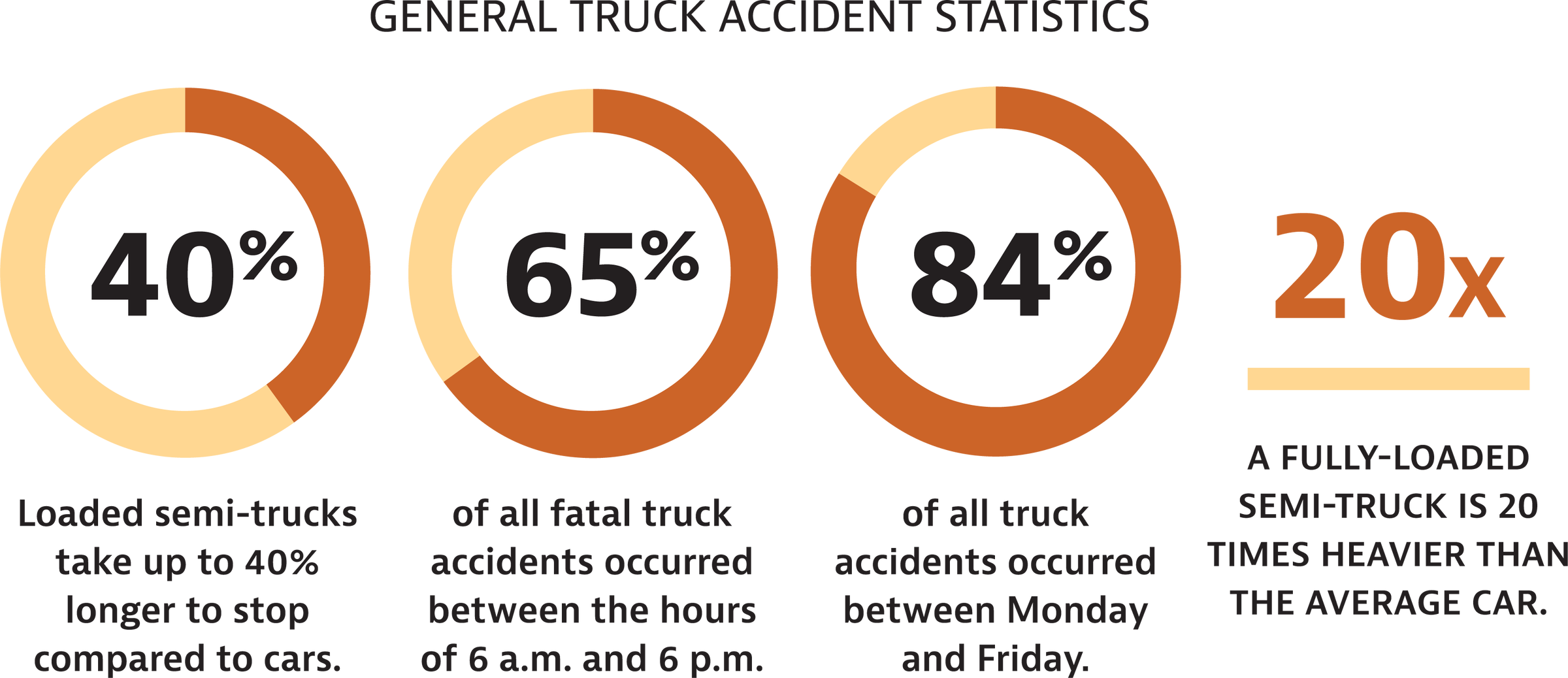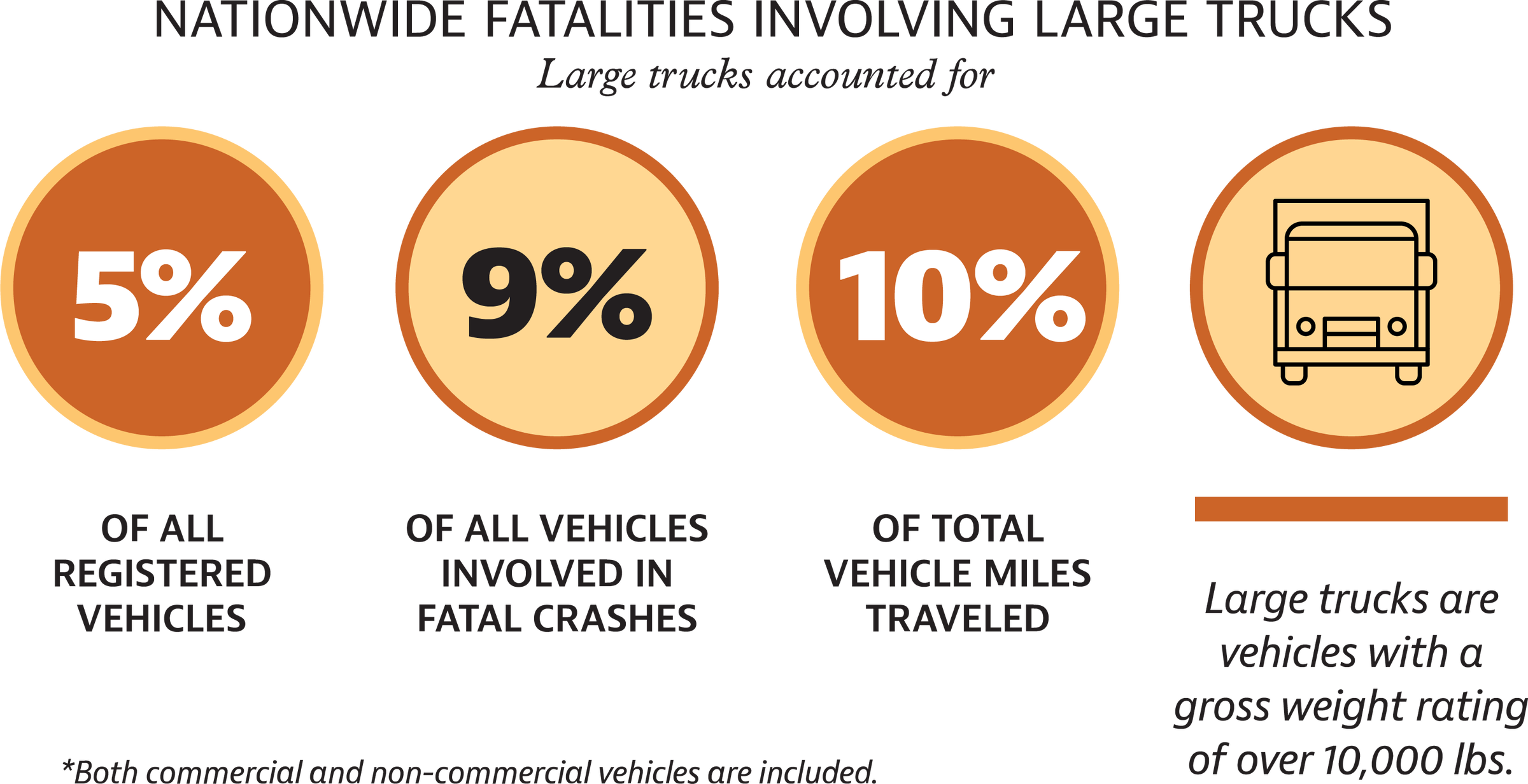Your success is our top priority.
Is someone looking out for your best interests? If not, we will. We understand that the effects of an injury can last for years and that you need financial and legal support to help you move forward with your life. Our approach has helped us recover millions of dollars in compensation for auto accident victims.
I had a great experience with my team at this firm. They handled my case thoughtfully and got me a great result. I highly recommend.
- Patrick D.
Philadelphia Truck Accident Lawyers
Semi-trucks and other large commercial vehicles are necessary to the United States’ economy. However, large trucks are also responsible for an increasing number of serious and fatal traffic accidents on Philadelphia highways. The portion of Interstate 76 leading into Philadelphia is notorious thorough the country as being a congested – and dangerous – highway. On the other side of the city, Interstate 95 connects Philadelphia with other large cities on the Eastern Seaboard, and is recognized as being one of the busiest highways in the country. Each of these highways sees a significant amount of truck traffic, and truck accidents.
The majority of Philadelphia truck accidents are the result of drivers who fail to follow the strict state and federal laws that govern all truck drivers. At MyPhillyLawyer, we aggressively represent accident victims in cases against truck drivers, trucking companies and large insurance companies. MyPhillyLawyer attorneys are well known in the community for being skillful and compassionate advocates for Philadelphia truck accident victims.
General Truck Accident Statistics
A fully-loaded semi-truck can weigh up to 80,000 pounds. This is about 20 times heavier than the average car.
Loaded semi-truck take up to 40 percent longer to come to a stop than a car. For example, a loaded truck traveling at just 60 miles per hour takes upwards of 335 feet to come to a complete stop. This is slightly greater than the length of a football field.
About 65 percent of all fatal truck accidents occurred between the hours of 6 a.m. and 6 p.m. and 84 percent of all truck accidents occurred between Monday and Friday.

National Truck Accident Statistics
It is alarming how frequently incidents involving large trucks occur. In 2021, there were more than half a million accidents involving large trucks across the United States.
In 2020, the United States experienced 415,444 large truck accidents. This number rose to 523,796 in 2021, marking a 26.1% increase in large truck accidents within a year.
Fortunately, most truck accidents do not lead to fatalities or injuries. In 2020, around 310,000 collisions resulted only in property damage. However, the bad news is that 101,000 truck crashes caused injuries, and 4,444 led to fatalities during that year.

Philadelphia poses several challenges to truck drivers. For instance, sections of Interstate 95 near Fishtown and Port Richmond have been under construction for years. During this time, traffic patterns and speed limits have changed and lanes have opened and closed, resulting in constant confusion among motorists. At the same time, as Philadelphia has grown, Interstate 76 has seen a major increase in the amount of traffic, making it stop-and-go for most parts of the day. Both of these highways create additional dangers for motorists who must commute alongside truck drivers.
The Top Causes of Semi-Truck Accidents in Pennsylvania
The Majority of Truck Accidents are Preventable
Traffic, congestion, and construction are not valid excuses for truck drivers to drive dangerously. In fact, the vast majority of Philadelphia truck accidents are preventable, and truck drivers are expected – and legally required – to follow all traffic laws and posted traffic signs. Additionally, truck drivers are required to follow specific state and federal regulations that govern the industry. For example, there are federal regulations establishing how many hours per day and per week that a truck driver can be on the road. For example, truck drivers can only drive for 11 hours a day and must take a 30-minute rest at least every eight hours.
One might expect that, given these added protections, the number of truck accidents would be lower than it is. However, due to the nature of the trucking industry, certain risks are significantly increased. To understand the causes of truck accidents, it is helpful to know a little bit about how the trucking industry pays truck drivers.
By and large, truck drivers are paid by the mile. Thus, the more mileage that a truck driver can cover in a day, the more money he can make. This incentives drivers to speed, and to spend as much time on the road as possible. Additionally, trucking companies expect that a driver will be able to deliver a load by a certain time, and there may be penalties for drivers who are unable to complete a delivery by the expected time.
Common Causes of Pennsylvania Truck Accidents
Distracted and drowsy driving are the two most commonly cited causes for Pennsylvania truck accidents. Distracted driving is common among all motorists, given the prevalence of technology. However, truck drivers are especially susceptible to driving when drowsy or distracted because they spend so many hours a day behind the wheel. While there are limits to the time a truck driver is allowed to be on the road, they are not always followed. And, truck drivers may resort to drugs to stay awake during long drives. In fact, according to one study, 30 percent of truck drivers admitted to having taken amphetamines. While a truck driver may think these substances help him stay awake and alert, in reality, they affect a driver’s judgment and perception and can increase their reaction times. In addition, it is common for a truck driver to experience a “crash” when the substance wears off.
The following are among the most common causes of Pennsylvania truck accidents:
Distracted Driving
Drowsy Driving
Intoxicated Driving
Vehicle Defects
Underride Accidents
PennDOT reported that the most common vehicle defects that resulted in a Pennsylvania truck accident were:
Tire/Wheel-Related Defects
996 crashes
Brake-Related Defects
723 crashes
Total Steering System Failure
357 crashes
Power Train Failure
265 crashes
Suspension Failure
86 crashes
Unsecured Trailer Load
42 crashes
Underride Accidents
Underride accidents are a specific type of collision that occurs when a truck and a smaller passenger vehicle collide, and the smaller vehicle is shoved underneath the truck. These accidents often shear off the top of the vehicle, and frequently result in serious injury or death. Federal law requires all trucks over a certain weight have an underride guard installed at the rear of the truck. An underride guard is a metal bar that prevents smaller vehicles from going underneath a truck. The trucking industry opposed the rear-underride law, and has thus far successfully prevented the passage of any laws requiring side- or front- underride guards.
Injuries in Philadelphia Truck Accidents
Given the size of semi-trucks, and the fact that most truck accidents occur on the highway, Philadelphia truck accidents often result in extremely major injuries, if not death. Regardless of the nature or perceived seriousness of an accident victim’s injuries, it is always better to obtain medical care in the wake of a Philadelphia semi-truck accident, if nothing else to rule out the possibility of long-term injuries. Often, those involved in a truck accident realize that they suffered more serious injuries than they initially realized.
The most commonly seen injuries in truck accidents are:
Broken Bones
The force involved in a semi-truck accident is unimaginable. While someone may be lucky, in a way, to walk away from a truck accident with cuts, bruises and broken bones, these are still significant injuries that must be treated.
Back and neck injuries
Injuries to the back or neck are among the most common in all Philadelphia car accidents. However, these injuries tend to be much more severe following a truck accident. As is the case with many internal injuries, there may not be symptoms immediately following the accident, and accident victims should be sure to visit a doctor even if they do not think they suffered major injury.
Spinal cord injuries
The bones in the spine are designed to protect the soft, gel-like spinal cord, which transmits nerve impulses throughout the body. However, when the spine is subjected to major trauma, the spinal cord can become damaged. Additionally, the small bones in the spinal cord, called vertebrae, can break. Spine injuries are among the most severe type of injury because they may require months or years of treatment and can even result in total, lifelong paralysis.
Head and brain injuries
There are several types of head injuries that can occur in a Pennsylvania truck accident, ranging in severity from a mild concussion to a traumatic brain injury (TBIs). A TBI can have long-lasting symptoms, including headaches, confusion, light-headedness, fatigue, seizures, vision problems, mood instability, memory loss and depression.
Burns
Semi-trucks have large fuel tanks that can ignite or explode upon impact. Fires can be difficult or impossible for accident victims to avoid because they spread very quickly and motorists are often left unconscious or are trapped in their vehicles after the truck accident.
Amputations or other disfigurement
An amputation can be the direct result of an injury sustained in a truck accident – such as a crushing injury to an arm or a leg. Amputations may also be required in cases involving very serious burns. In either case, those undergoing an amputation may need an adaptive device, such as a prosthetic limb.
Internal injuries
Even when it seems like there are no outwardly visible injuries after a major trucking accident, there may be damage to internal organs. While airbags may save a motorist’s life, they can also cause major trauma to the abdominal region when they deploy, including damage to the spleen, bladder, liver or pancreas.
Fatal Trucking Accidents in Philadelphia
Losing a loved one in a Philadelphia truck accident is a tragedy beyond measure. However, each year, over 4,000 people are killed in fatal truck accidents, leaving many family members to deal with the aftermath. While nothing can bring back a loved one who was lost in a truck accident, Pennsylvania law allows family members to pursue a wrongful death claim against the parties responsible for their loved one’s death.
Pennsylvania Wrongful Death Claims
Under Pennsylvania Consolidated Statutes section 8301, a spouse child or parent can bring a claim to “recover damages for the death of an individual caused by the wrongful act … or negligence of another.” These are referred to as Pennsylvania wrongful death claims. A wrongful death case is very similar to a Philadelphia personal injury case in that it requires a person prove that the named defendant:
1) Owed the accident victim a duty of care
2) Violated that duty of care
3) The violation resulted in the accident victim's death
Under Pennsylvania Consolidated Statutes section 8301, a spouse child or parent can bring a claim to “recover damages for the death of an individual caused by the wrongful act … or negligence of another.” These are referred to as Pennsylvania wrongful death claims. A wrongful death case is very similar to a Philadelphia personal injury case in that it requires a person prove that the named defendant 1.) owed the accident victim a duty of care; 2.) violated that duty of care; and 3.) the violation resulted in the accident victim’s death.
Under the applicable statute of limitations, Pennsylvania wrongful death claims must be filed within two years of the date that the accident victim dies. This does not require that the case be heard and decided within two years, only that it is filed. A family’s failure to bring a case within the two-year time frame will likely result in the case being dismissed, leaving the family with no means of recourse.
Our Record of Success: Verdicts & Settlements
These are just examples of the injury cases we successfully handle every year. Our Philadelphia law firm recovers millions of dollars annually for clients.
0MILLION
Birth injury causing brain damage0MILLION
Brain injury from ATV accident0MILLION
Tractor Trailer collision resulting in death0MILLION
Shattered hip, high-impact car crash0MILLION
Car crash resulting in shattered hipContact a Dedicated Philadelphia Truck Accident Law Firm
If you or loved one has recently been injured in a Philadelphia truck accident, you may be entitled to significant compensation. At MyPhillyLawyer, we represent those who have been seriously injured in all types of motor vehicle collisions, including semi-truck accidents. Our skilled team of Philadelphia trial attorneys is comfortable both at the negotiation table as well as in court. We aggressively pursue favorable settlement offers when possible, but will not hesitate to take a case to trial if the other side is unwilling to engage in fair negotiations. To learn more about how we can help you recover compensation for the injuries you have sustained, call 215-227-2727, or toll-free (866) 352-4572. Calling is free, and we will not bill you for our services unless we can help you recover for your injuries.
 Skip to content
Skip to content




